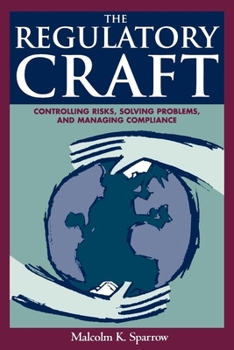The Regulatory Craft: Controlling Risks, Solving Problems, and Managing Compliance
Select Format
Select Condition 
Book Overview
A Brookings Institution Press and the Council for Excellence in Government publication
The Regulatory Craft tackles one of the most pressing public policy issues of our time--the reform of regulatory and enforcement practice. Malcolm K. Sparrow shows how the vogue prescriptions for reform (centered on concepts of customer service and process improvement) fail to take account of the distinctive character of regulatory responsibilities--which involve the delivery of obligations rather than just services. In order to construct more balanced prescriptions for reform, Sparrow invites us to reconsider the central purpose of social regulation--the abatement or control of risks to society. He recounts the experiences of pioneering agencies that have confronted the risk-control challenge directly, developing operational capacities for specifying risk-concentrations, problem areas, or patterns of noncompliance, and then designing interventions tailored to each problem. At the heart of a new regulatory craftsmanship, according to Sparrow, lies the central notion, "pick important problems and fix them." This beguilingly simple idea turns out to present enormously complex implementation challenges and carries with it profound consequences for the way regulators organize their work, manage their discretion, and report their performance. Although the book is primarily aimed at regulatory and law-enforcement practitioners, it will also be invaluable for legislators, overseers, and others who care about the nature and quality of regulatory practice, and who want to know what kind of performance to demand from regulators and how it might be delivered. It stresses the enormous benefit to society that might accrue from development of the risk-control art as a core professional skill for regulators.






